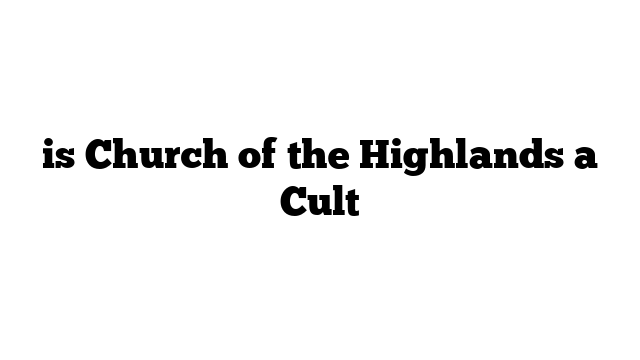Miscellaneous
Debunking the Myths: Church of the Highlands
Introduction
In recent years, there has been some controversy surrounding the Church of the Highlands, with claims that it may be a cult. These allegations have gained attention on online platforms, sparking discussions and debates among its members and others. However, it is important to approach such claims with critical thinking and an open mind. In this article, we aim to address these concerns and shed light on the Church of the Highlands.
What is the Church of the Highlands?
The Church of the Highlands is a non-denominational Christian church located in Birmingham, Alabama. Founded in 2001 by Pastor Chris Hodges, the church has grown rapidly and become one of the largest churches in the country, with multiple campuses in Alabama and beyond. The core belief of the church is centered around the love and grace of Jesus Christ and the importance of community.
The Cult Allegation
One of the main claims against the Church of the Highlands is that it is a cult. However, it is essential to consider the source and evaluate the validity of such allegations. The term “cult” is often used loosely and subjectively, but it typically refers to a group that exhibits extreme and controlling behavior, isolates its members, and manipulates them for personal gain. These characteristics are not evident in the Church of the Highlands.
Lack of Evidence
Upon closer examination, there is a lack of substantial evidence to support the cult claim. The allegations seem to stem from anecdotal reports, personal experiences, or misunderstandings rather than concrete evidence. The Church of the Highlands engages in traditional Christian practices, such as weekly worship services, Bible studies, baptism, and community outreach. It encourages its members to live out their faith and foster connections with others.
Charismatic Practices
Another aspect that has led to accusations against the Church of the Highlands is its charismatic style of worship. Charismatic practices, such as speaking in tongues and expressions of intense emotion during worship, can sometimes be misunderstood as cult-like behavior. However, it is important to recognize that these practices have been present in Christianity for centuries and have roots in the early church. Many churches, even those outside the charismatic tradition, may incorporate these practices into their worship.
Community and Outreach
One of the defining characteristics of the Church of the Highlands is its emphasis on community and outreach. The church places a strong focus on building relationships and supporting its members. It offers a variety of small groups and ministries that cater to different age groups, interests, and needs. Additionally, the church is involved in numerous charitable initiatives, including initiatives aimed at tackling poverty, homelessness, and addiction. These efforts demonstrate the church’s commitment to making a positive impact in the community.
Freedom to Leave
A hallmark of cults is the lack of freedom to leave or disassociate oneself from the group. However, this does not seem to be the case with the Church of the Highlands. Members are free to come and go as they please and are under no obligation or pressure to remain in the church. The church does not employ manipulative tactics or engage in practices that hinder individual autonomy.
Conclusion
The Church of the Highlands, despite the claims made against it, does not exhibit the characteristics of a cult. Instead, it is a thriving Christian community dedicated to teaching and living out the message of Jesus Christ. While it is always important to critically evaluate any organization, it is equally crucial to approach these discussions with facts and an understanding of the context. The Church of the Highlands continues to impact lives positively and foster a sense of belonging among its members.

